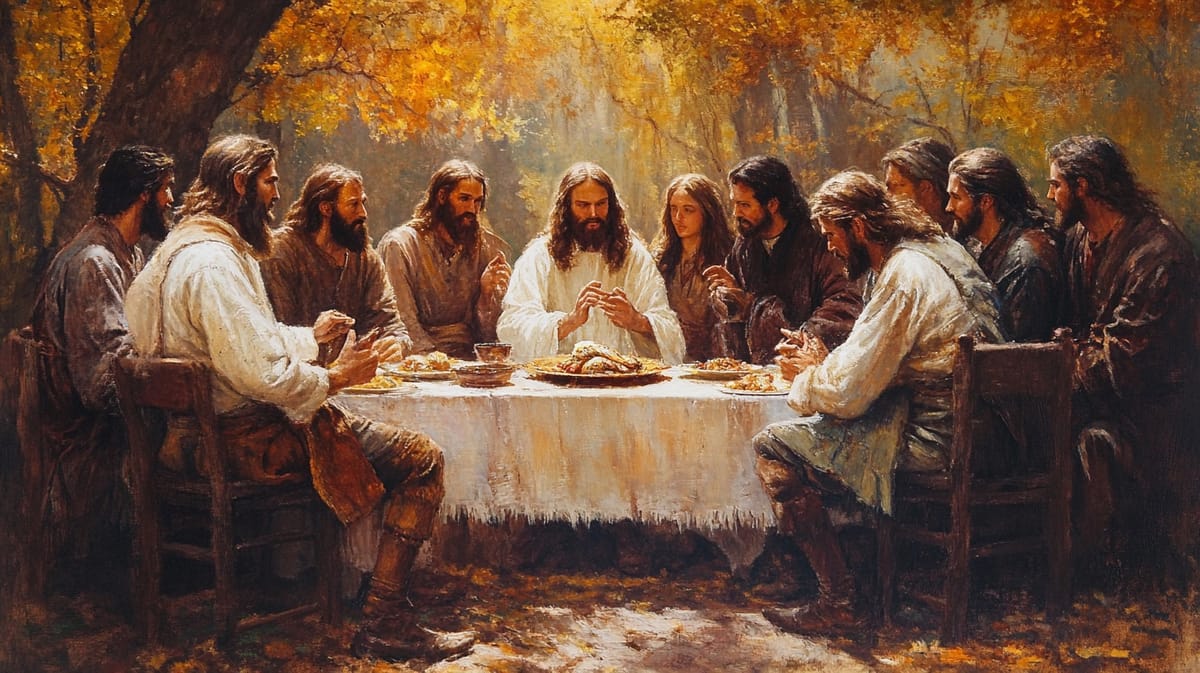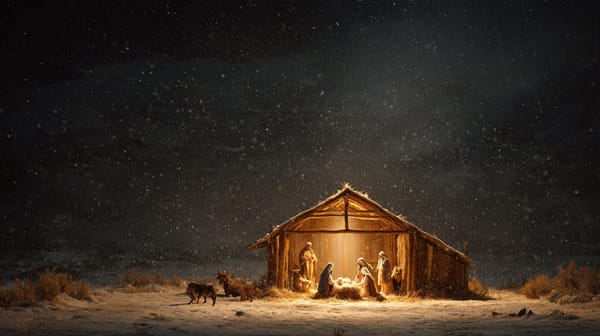Fairhaven Sermon 5-4-2025

Summary
In this week’s service, Rev. Peg Bowman explored the interconnectedness of scripture across time, drawing parallels between Psalm 30 and John 21 to highlight God’s enduring plans for His people. She began by reflecting on the joy of parenting and the idea of building homes, likening David’s preparations for Solomon’s temple to Jesus’ foundational work with the disciples after His resurrection. Bowman emphasized how these stories—separated by a millennium—reveal a consistent divine purpose: God’s commitment to creating spaces for worship and community. She detailed David’s role in planning the temple, despite his own imperfections, and contrasted this with Jesus’ post-resurrection encounter with the disciples, where He restored Peter through forgiveness and redefined the church’s mission. The sermon underscored themes of faith, humility, and God’s unchanging love, bridging ancient and modern expressions of devotion.
Rev. Bowman further unpacked the significance of Jesus’ post-resurrection meal with the disciples, framing it as a symbolic “fish fry” where healing and reconciliation took place. She highlighted Jesus’ emphasis on love as the foundation of the church, exemplified by His repeated calls to Peter to “feed my lambs,” transforming betrayal into a mission of care. The sermon concluded by tying these narratives to the promise of God’s eternal home, built not on human perfection but on divine love and trust. Bowman stressed that just as David and Jesus prepared for future generations, God’s love enables believers to live with hope, joy, and confidence in His unending care. The message closed with a reflection on how love—both received and given—forms the eternal “house” God is building for all who seek Him.
Transcript
Pray with me, please. Lord Jesus, please come and speak through me. Come and touch our minds and our hearts today with your love and your truth. In Jesus' name, amen.
I was just thinking as Flo was reading that passage from Revelation, that's the text that is used for the very, very end of Handel's Messiah. And I could hear the song going in the background. It's just, I'm not preaching on that one today, but I just had to mention that's beautiful, beautiful. Anyway, before I get started today, this being the fourth day of May, I do have to say to all the Star Wars fans out there, May the fourth be with you.
Turning to our scriptures for the third week of Easter. One of the great joys of parenting is watching kids grow up and begin to make plans for their lives. As the kids grow up, they start to think about getting their own place. And it can be so much fun to help them imagine and decorate and maybe even help with the down payment on the first house.
So cool to watch them putting together a home for the next generation. Yeah. And in a way, that's what's happening in our scriptures for this week, particularly in the psalm and in the Gospel reading from John. In the psalm, David is helping his son Solomon make plans for God's temple.
that will be built as a house for God's worship and for God's people. And in the Gospel from John, we see God and Jesus working together with the disciples to lay the foundation for our spiritual house, the beginnings of the Christian church. So each reading is a story in itself, but each one contains those wonderful plans for the future for God's people. So let's take a look and we'll start with Psalm 30.
Now, first off, in terms of time when these things were written, Psalm 30 and the Gospel of John were written almost a thousand years apart, almost exactly. Psalm 30 was written in Jerusalem in the south of Israel around 970 BC. John chapter 21 takes place in Galilee in the north of Israel around the year 30 AD. And just as for kind of a little reference, a thousand years ago from today, our forefathers and foremothers lived without electricity all the time.
and without motors of any kind and without modern medicine. So things can change a lot in a thousand years. One of the great things about our faith is that it is so remarkably consistent throughout all time. People may change, people may mess up sometimes, but God knows what God is doing, and God is the same yesterday and today and forever.
The similarity and the connectedness between these two readings, separated as they are by 10 centuries, is one of the great things that gives us a real sense of permanence to our faith and to the Scriptures. So starting with Psalm 30. Psalm 30 is a psalm of thanksgiving and praise. It focuses on God's promises of good things in the future.
And David is sharing his praise as he writes this, his thanksgiving and his joy. And David has walked with God all his life. Now that doesn't mean that David was without sin, far from it. He was human like all the rest of us, but he had loved God all his life.
And as we know, the book of Psalms was basically the hymnal of the ancient Israel. These Psalms were meant to be sung. But like most great songs, even just reading the words can capture your thoughts and feelings that went into that song. And the note at the top of this psalm, David says that he wrote it for the dedication of the temple.
But the temple hadn't been built yet. And the book of Chronicles gives us the back story. King David had wanted to build a great house of worship for the Lord, but God said no. God said David was a man of blood.
In other words, he had caused many human deaths, which was true. Scripture doesn't say exactly which deaths God was referring to, but it's not. Was he talking about David's military conquests? Possibly. I mean, Scripture is generally against violence, but it's not 100% anti-war.
Or was God talking about David killing Goliath? I tend to think that one's not it, because in that particular battle, David was defending and protecting the armies of Israel. But, Or was God talking about Bathsheba and her husband Uriah who David had killed? I think that's probably part of it. But the bottom line was in one way or another, David had arranged for hundreds of people to depart this earth and move on to the next life. He was a man of blood.
On the other hand, God also knows how very much David loves God. There are places in Scripture where David is called a man after God's own heart, a man whose will and whose life were dedicated to God. God's relationship with David shows how very forgiving God can be. and how very much God wanted David and wants all of us as well to be in relationship with God.
So at the end of the conversation, God promises David in the Old Testament that his son Solomon will be the one to build a temple for God's great name and for the people to worship in. And David is overjoyed at this message. So before David died, he appointed Solomon as his successor because he had many sons and David made all the preparations necessary for this great project. This temple, this house of God would be the crowning achievement of Solomon's life.
And so like any loving parent, David starts to make provisions for this great house. He orders timbers and cut stones from the nations around them. He collects up gold and silver for the plates and the cups and the candlesticks in the temple. And he collects up embroidered fabrics and perfumes.
He has technical designs drawn up. And I'm sure that as all these plans went forward, he was telling Solomon about every detail, sharing this with his son, and telling Solomon what he would need to do to complete the project. And David thought of everything, even the music for the grand opening. David wrote a song for the congregation to sing on that great day, and Psalm 30 is it.
How cool is that? I find it interesting that this song of praise, Psalm 30, is not like other songs of praise that we typically hear for heroes or for great leaders or for great events. The song does praise God, but not for giving victory to Israel's army or for solving all of Israel's problems. The psalm does say that God has not allowed enemies to rejoice over them in victory, but mostly the song praises God for getting God's people out of the way of their enemies, for healing, for rescuing God's people out of Sheol, which is not hell, by the way. Sheol was thought back then to be a place where the soul went when the person died, sort of like a holding area until the judgment day.
The song thanks God for resurrection and also for God's help. And David sings, weeping may linger for the night, but joy comes in the morning. And how many times and places have we heard those words? And how many times have we prayed them? So here in this great public celebration, this first worship service in the newly built temple, the song that David wrote for this event is remarkably personal. It's remarkable.
David is not focused on Israel being God's nation, but rather encourages each person present, each worshiper, each one of the thousands in the temple, to sing about how God has been there for him or for her personally. and also to sing about confidence for the future, confidence not in the worshiper but in God. This is what a godly nation looks like in worship: personal, humble, thankful, and confident, not in ourselves but in God's goodness and God's care. So that's the future that David was building towards.
And then as we turn to our reading from the Gospel of John, a thousand years later, we're still dealing with the same God. Just at this point in time, God is present in the flesh, as well as in the Spirit, because Jesus is there. After Jesus' resurrection, and after the disciples met with the risen Jesus during the week of Easter, the disciples seemed kind of uncertain as to what to do next. Jesus had told them to meet him in Galilee, that's back in the book of Matthew he said that, but exactly where and when is not clearly defined.
Jesus just says, Meet me in Galilee. So in the book of 1 Corinthians, Paul tells us that over 500 disciples saw Jesus in Galilee after the resurrection. But that meeting hasn't happened yet. It seems at first just the inner circle was told to go to Galilee and wait ahead of Jesus.
So some of the disciples got there before the others, and with nothing else to do, they fell back on their habit of fishing. They went out fishing, but the fish weren't biting that night. And in the morning, Jesus made himself known by doing again what he had done before, letting them know where to let the nets down to catch the fish. It's interesting that this fishing advice is what told the disciples it was Jesus.
There are a number of times after the resurrection that the disciples don't recognize Jesus by sight. And why this happens is not clear. Scripture doesn't address the question, and theologians actually don't talk about it much. So after doing some research, I think the best answer I was able to find was not from a theologian, but from a scientist who said that a body that passes from life into death, into life again, would go through a number of chemical changes, processes that we don't usually see because we don't usually see dead people, and these processes would change a person's cell structure in some way.
And of course this is guesswork, but to me it makes sense. A resurrected body would probably not look the same as the body did before someone died. At any rate, from now on, Jesus will be recognized not by how he looks, but by who he is. In which case the Apostle Paul was right when he said that faith comes by hearing, and hearing by the word of God, as opposed to by seeing.
E Meanwhile, the disciples were pulling the net with all the fish on shore. While Peter has once again jumped out of the boat and is swimming to Jesus, Jesus already has a fire going on the shore and is already grilling some fish. Now, where these fish came from, we don't know. They added some more from the net, but there were some already frying.
So, at any rate, there's a fish fry in the works, and as the disciples gather, they share the joy once again of eating with Jesus, having fish, they had some bread on the side, and their joy is even greater because the fellowship has been restored, and those terrible events in Jerusalem are now behind them, and they're once more together with Jesus. See, Jesus has plans and the Father has plans. God the Father has plans. This is not just a reunion.
God is going to build a house. And God's son Jesus is going to be like Solomon, the one for whom the house is being designed. And just like the parts of the temple came together in ancient Israel, the parts of the church now come together to be the bride of Christ. And God the Father, like any loving parent, is preparing a place for Jesus and his bride.
That's us in a forever home. But there's still a lot of details that need to be pulled together. And the first is to heal the pain of the betrayals that happened the night that Jesus was arrested. All the disciples had run away that night, except for Peter, who followed at a distance and then swore three times that he'd never met Jesus.
Jesus. So when breakfast is over, Jesus goes about setting things right, and he starts with Peter. And Jesus asks Peter, do you love me? And Peter says, yes, Lord, you know I love you. And Jesus says, feed my lambs.
Now, Jesus is taking something that might have ended the church before it started and turns it into the very foundation of the church, forgiveness and a caring outreach for others. And Jesus asks again, same answer, same assignment, feed my lambs. And I notice at this point what Jesus does not say. He does not tell Peter, go kill the Romans, or go take down the Sadducees, or go kick all the non-Jews out of Israel.
Feed my lambs, he says, both with food and with spiritual food. And this is what Peter is called to do as the foundation of the church is being laid. Oh. And then Jesus asks a third time, do you love me? And his words cut to Peter's heart.
He says, you know all things, Lord, you know I love you. Feed my lambs. And then Jesus tells Peter that Peter will suffer for God's word, he will one day find that he's no longer a free man, he will be bound and made a prisoner and will be martyred for the faith. And Peter raises no objections.
And Jesus says, Follow me. because Jesus has already been there. Jesus has already passed through death. He and he is now alive to tell the tale.
And this is the hope, and this is the new home that is being built, a life that cannot be taken away. So what does this say for all of us? God has gone ahead of us just like David did with Solomon, preparing the temple, preparing the future, and Jesus has gone before us, giving his life so that we can live, and then preparing a place for us, a forever home, that we can't even begin to imagine right now. And the reason for all of this is love. God's love for us, Jesus' love in giving his life for us, and our love for God, following as we are able in the footsteps of David and Peter.
The greatest thing we can do in this life and in the next is to receive God's love and to love God back. Love is the material out of which our forever home is built, the home that God is building for us and for all who love God. As David says, Weeping may linger for the night, but joy comes in the morning. Amen.



